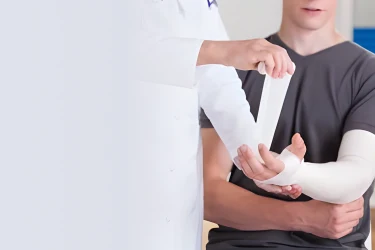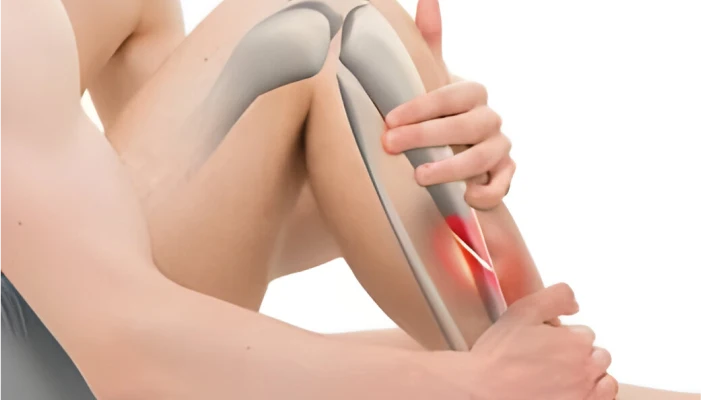Home
Robotic Knee Surgery
Blogs
Book Appointment
Get in Touch
Symptoms
The severity of a fracture is determined by the site of the fracture, the person's age and the severity of injury.
People who have a fracture, are likely to have the following symptoms:
Pain
Bruising
Swelling
Discolored skin around the affected area
Bleeding if it is an open fracture
Inability to move the affected area
Inability to put weight on the injured area
Causes of Bone Fractures
Bone fractures, or broken bones, can occur due to a variety of causes, ranging from traumatic injuries to underlying health conditions. Understanding the different factors that contribute to bone fractures can help in preventing them and seeking appropriate treatment. Here are some common causes of bone fractures:
- Trauma and Accidents: Falls, motor vehicle accidents, and sports injuries are frequent causes of fractures. High-impact events or sudden trauma can break bones.
- Osteoporosis: Weakened bones due to osteoporosis can easily fracture from minor falls or stresses, especially in older adults and postmenopausal women.
- Repetitive Stress: Stress fractures result from repeated overuse, commonly seen in athletes involved in running or jumping sports.
- Medical Conditions: Diseases such as bone cancer, Paget’s disease, and bone infections can weaken bones and increase fracture risk.
- Nutritional Deficiencies: Lack of essential nutrients like calcium and vitamin D can weaken bones, making them more prone to fractures.
- Genetic Factors: Genetic conditions and family history of bone disorders can heighten fracture risk.
- Age: As people age, bones naturally become more fragile, increasing the risk of fractures from falls or minor impacts.
Diagnosis
The circumstances that lead to a person's fracture will be investigated by a fracture specialist. They'll then conduct a physical examination in order to make a diagnosis.
To completely assess the fracture, they will frequently request an X-ray and, in some situations, an MRI or CT scan.
Dos and Don’ts
Bone Fracture Treatment in Mumbai at Kapadia Hospitals
Bone fractures require prompt and effective treatment to ensure optimal healing and recovery. At Kapadia Hospitals in Mumbai, we provide comprehensive care for all types of bone fractures, utilizing advanced techniques and technologies to deliver the best outcomes for our patients.
Our team of experienced orthopedic specialists in Mumbai is dedicated to diagnosing and treating fractures with precision and care. From initial assessment to post-treatment rehabilitation, we offer a complete range of services tailored to meet individual needs. Our state-of-the-art facilities ensure accurate imaging, such as X-rays and MRIs, to determine the extent of the fracture and devise the most effective treatment plan.
- Non-Surgical Treatments: For many fractures, casting or splinting may be sufficient. Our team carefully monitors the healing process to ensure proper alignment and recovery.
- Surgical Interventions: For more severe fractures, we employ advanced surgical techniques, including internal fixation with plates, screws, or rods, to stabilize and repair the bone.
- Rehabilitation Services: Post-treatment, our rehabilitation program includes physical therapy and guidance on exercises to restore strength and mobility, ensuring a full recovery.
We prioritize patient comfort and well-being, offering a supportive and compassionate environment. Our dedicated staff ensures that every patient receives the highest standard of care, addressing any concerns and providing clear communication throughout the treatment journey. For expert bone fracture treatment in Mumbai, trust Kapadia Hospitals to provide exceptional care and support. Contact us today to schedule a consultation and take the first step towards a swift and successful recovery.
Frequently Asked Questions Answered by Our fracture specialists in Mumbai
How do I know if I have a fracture or just a sprain?
If you experience severe pain, swelling, bruising, or difficulty moving the affected area, you may have a fracture. An X-ray or MRI, conducted by a specialist, can accurately diagnose the injury.
What are the common treatment options for bone fractures?
Bone fracture treatment options include immobilization with a cast or splint, traction, or surgical intervention (such as internal fixation using plates, screws, or rods) depending on the severity of the fracture.
How long does it take for a fracture to heal?
Healing time varies based on the type and location of the fracture, as well as the patient’s age and overall health. On average, fractures take 6 to 8 weeks to heal, though some may require longer recovery periods.
Will I need physical therapy after a fracture?
Yes, in many cases, physical therapy is recommended after the initial healing phase to regain strength, flexibility, and mobility in the affected area.
Do you offer emergency fracture care?
Yes, our fracture specialists in Mumbai provide 24/7 emergency care to quickly diagnose and treat fractures, ensuring you receive immediate attention for your injury.
How can I book a free consultation?
You can easily book a free consultation by contacting Kapadia Hospital directly via phone or visiting their website.
How can I prevent fractures in the future?
You can reduce your risk of fractures by maintaining good bone health through a balanced diet rich in calcium and vitamin D, engaging in regular weight-bearing exercises, and taking safety precautions during physical activities.
How can I book a consultation with a fracture specialist in Mumbai?
You can easily book a consultation by contacting our hospital, either by phone or through our website, to discuss your symptoms and treatment options with an experienced fracture specialist.


